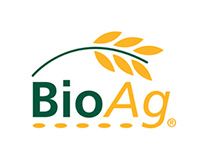Vegetable crops
The Australian vegetable-growing sector is an important source of food. It supplies most of the fresh vegetables consumed in Australia and provides inputs for the processed vegetable products consumed in Australia or exported. Around 4% of all Australian farms grow vegetables for human consumption. Vegetable production is the sixth-highest value agricultural industry in Australia, accounting for around 7% of the gross value of agricultural production.
Specific considerations for vegetables
There is a broad range of annual and short-season vegetable crops. Underpinning quality and yields is the need for balanced fertile soils with the appropriate nutrition and organic carbon levels.
A common issue with vegetables is the overuse of nitrogen fertiliser due to poor soil properties and poor soil structure or composition. Performing soil tests ahead of planting and planning your applications of fertiliser and ameliorants, including compost, will ensure fields are prepared prior to planting.
In soils with low fertility or a level of soil antagonists, soil biostimulants will support the retention, cycling, and supply of nutrients to crops. The use of foliar biostimulants in the application of liquid fertilisers or chemicals will support crop physiological functions including the translocation of nutrients with crops.
The BioAg approach
BioAg nutrition programs are incorporated into a growers current nutrition program. Our objective is to make fertiliser and other inputs work better and build and support healthy and balanced soils and plants. Programs are custom-made for each block, using advanced soil and tissue analysis. These integrated programs typically incorporate a range of BioAg solid and liquid nutrients, often associated with conventional inputs. BioAg fertility programs can be developed to meet organic certification requirements.
Soil test
An experienced and Fertcare accredited BioAg agronomist works with you and provides technical expertise on your crop. If you don’t already have recent soil test data, we arrange a soil test for you. The results provide essential information about the soil fertility and soil structure for better performance. Download the BioAg soil sampling procedure here.
A tailored program
Based on the results of soil tests, crop requirements and other factors such as soil structure, climate, history of the block, and targets that you are trying to achieve, we provide a tailored program that aims to improve soil fertility and maximise yield response. We support you through the program to ensure that inputs are applied at the right time, in the right way.
Leaf and tissue testing
Any nutritional program cannot foresee the changes in weather, disease, or pests, that may impact a crop. During the season, growers may observe issues or evidence of stress in their crop. This may be due to greater growth or yields than planned, a trace element shortage or abiotic stresses. An on-farm inspection and associated leaf or tissue tests will promptly identify any issues, which can quickly be addressed by applying the appropriate inputs. Download the BioAg leaf sampling procedure here.
High yielding crops require fertile balanced soils
Key to highly productive crops is the function of soils. Soil structure, chemistry and biology are critical in supporting crops throughout the growing season. By improving all aspects of the soil, crops will benefit from improved access to moisture, due to improved infiltration and water holding capacity, improved access to nutrition through improved nutrient cycling, fixation (for N) and a reduction in loss pathways, improved resilience to abiotic stresses and disease, improved root growth providing access to additional moisture and nutrients as well as improved carbon sequestration and a range of other benefits (click for more on soil health).
Beneficial microorganisms stimulate the plant’s root growth and help protect it from abiotic stresses. This is made possible through mutually beneficial relationships that microbes develop with plants, for example mycorrhizal associations. BioAg products programs supply essential macronutrients (N, P, K, S, Ca), trace elements (B, Zn, Cu etc.), microbial food and metabolites beneficial microorganisms that colonise root systems, improving soil function, plant health and productivity.
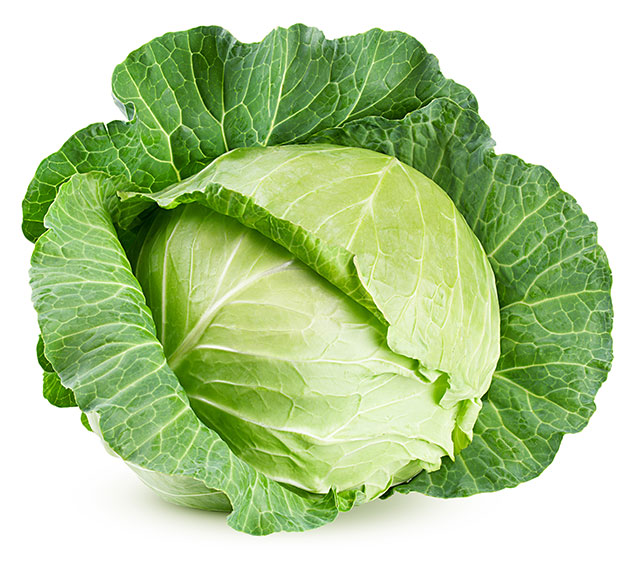
Vegetables (that form heads) – key features of a BioAg program
The following table illustrates the cropping process and potential solutions depending on soil test results and other contributing factors. Call your BioAg Area Manager to discuss your individual needs.
Vegetable resources
- Soil-nutrient relationships
Nutrients, such as calcium and magnesium, may be supplied to plants solely from reserves held in the soil. Others like phosphorus and nitrogen are added regularly to soils as fertiliser to be withdrawn as needed by crops.
- Getting the soil balance right
Dhami Singh, originally from the Punjab region of India, has always been passionate about farming. After immigrating to Australia, he now leads a team of 14 people in Shepparton Victoria, growing 200 acres of zucchini under contract. With a master’s in mathematics, Dham...
- Biostimulants increase yield benefits
The yield map from the Summer 2023 harvest near Brocklesby in Southern NSW visibly shows the positive impact of BioAg’s biostimulant program on yield.
- Organic produce case study, Coleambally NSW
Former rice growers, Neill and Gina Wiseman, have transformed a block of worn-out station country into a thriving large-scale organic vegetable farm by using biological farming techniques. Neill and Gina and their sons, Ryan and Luke, are now earning premiums from the s...
Recommended products
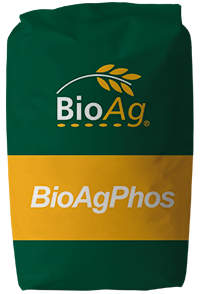
BioAgPhos
Solid Fertiliser
Highly reactive phosphate fertiliser made from high-grade reactive phosphate rock combined with BioAg’s microbial digesting agent.
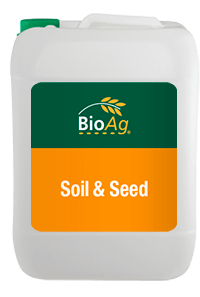
Soil & Seed
Biostimulant
Formulated to improve soil microbial activity, natural soil fertility and moisture and nutrient utilisation.
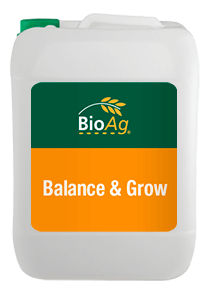
Balance & Grow
Biostimulant
Formulated to increase vegetative growth, root development and soil microbial activity. Ideal for broadacre, pastures and horticulture.
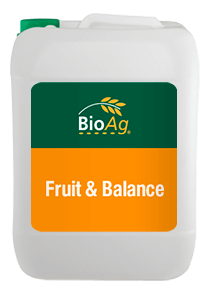
Fruit & Balance
Biostimulant
Formulated to increase flowering, fruit set and soil microbial activity. Fruit & Balance enhances the nutritional value and quality of fruit or grain by increasing plant sugar levels.
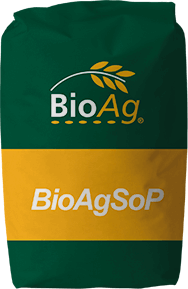
BioAgSoP
Solid Fertiliser
Organically certified granular form of fertiliser containing potassium and sulphur. Immediately available to crops and plants. Ideal for crops with a high potassium demand and sensitive to chloride.
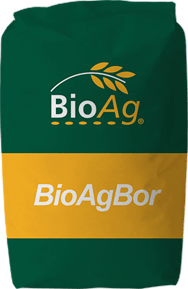
BioAgBor
Trace Element
A sustained-release form of boron suited to a range of enterprises such as horticulture, vegetables, pastures and field crops.
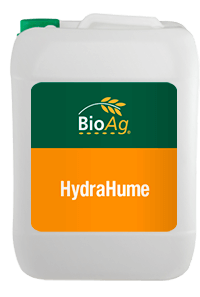
HydraHume
Biostimulant
A liquid solution of Potassium Humate providing a product suited to building soil humus and increasing soil fertility.

Committed to organics
With a core range of natural fertilisers and biostimulants, BioAg can offer an extensive range of products certified by Australian Organics, suitable for use in organic systems.
